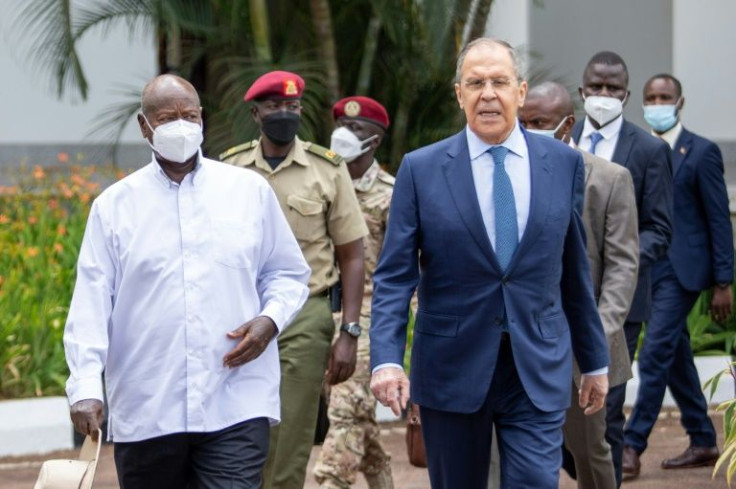Isolated, Russia Offers Food, Energy Assistance To Africa

As the West continues to isolate Russia with tightening sanctions, the latter has started using food as a bargaining chip and has selected the right place - hunger-hit and strife-torn Africa -- to kick start the new crusade as its war in Ukraine has entered its sixth month.
With its foreign minister Sergei Lavrov visiting poor nations of Africa, Moscow is using the threat of starvation in developing countries to its advantage. During the four-nation tour, Lavrov's message to the embattled continent is loud and clear.
Russia, which enjoys a near monopoly on fertilizers and wheat in global trade, was not the problem and is willing to offer grains for a cut along with oil to African nations because out of 54 African nations, 17 abstained in a March vote on a United Nations resolution and no African nations so far have joined the US-led sanctions against Moscow to isolate Russian economy from the global trade.
That balancing act by the African Union (AU) became apparent last month when its president Macky Sall of Senegal met with Putin and echoed Moscow's argument that the U.S. sanctions have worsened the food crisis in Africa.
After spending time in Egypt, Lavrov reached Congo, a small oil-producing former French colony. He headed to Uganda on July 27 to end the four-nation tour in Ethiopia, which has long been a stalwart ally of the West but recently fell out with the U.S. over a conflict in its northern region of Tigray. Ethiopia is facing a severe food crisis and malnutrition. In Addis Ababa, Lavrov's talks will center on food and money.
Egypt's economy was dealt a severe blow because of the knock-on effects of Russia's invasion of Ukraine. As one of the world's top wheat importers, Egypt depends on Russia and Ukraine. Currently, the country, led by the military, is banking on the International Monetary Fund (IMF) for help. In Egypt on July 24, Lavrov assured his Egyptian counterpart, Sameh Shoukry, that Russia would meet grain orders.
Congo is afflicted with widespread civilian unrest. The fighting in the country is all about its vast mineral wealth and all sides are taking the current mayhem in the country to their advantage. Lavrov met with Congo's President Denis Sassou N'guesso and Foreign Minister Jean-Claude Gakosso. His visit to the country is a first by a top Russian diplomat.
Uganda abstained from the UN voting. While meeting Lavrov July 27, Ugandan President Yoweri Museveni, who has been in power for 36 years, extolled Russian-African friendship. The nation is passing through its worst drought in 40 years. In July, the US announced a $1.3 billion package to help tackle hunger in the region.
The West often pampers Museveni with huge sums of aid. But one of the longest-serving leaders in the world clashed with the West by accusing it of interfering in domestic affairs.
Russia is cementing its ties with Africa to gain a foothold on the continent as a security broker by projecting the image of a defender of the poverty-hit continent -- an objective the U.S.-led West failed to achieve miserably.
Months before Lavrov's visit, Russia had signed many military deals with the continent. Militaries in Sudan, Chad, Guinea Conakry and Guinea Bissau, which experienced coups in the past year, have strong ties with Russia. In early January Russia sent hundreds of military advisors to Mali, another former French colony.
Russia has made its presence felt across the continent with investment in mining, financial loans, and the sale of agricultural equipment and nuclear technology. The country was the largest arms exporter to sub-Saharan Africa from 2016 to 20, according to the Stockholm International Peace Research Institute (SIPRI).
Just like the Russia-Africa summit held in Sochi in 2019, Lavrov plans to enact a similar one this time, possibly in the Ethiopian capital.
Among important strategic African nations, Russia has succeeded in reinforcing the anti-western narratives and managed to lay its hands on valuable resources which have helped Russia resist the western sanctions imposed following its Ukraine invasion.
The erstwhile USSR helped many African countries like South Africa, Zimbabwe, Angola and Mozambique with Soviet-made weapons, cash and advisers during their freedom struggle.
Russia has highlighted this history since the beginning of the war in Ukraine, repeatedly saying that Russia never colonized any African country and has been on the side of Africans against western imperialism.
The West is losing no time to court Africa. French President Emmanuel Macron is planning a visit to Cameroon, Benin and Guinea-Bissau and U.S. Special Envoy for the Horn of Africa Mike Hammer is on his way to Egypt and Ethiopia. France was a big-time colonizer of Africa and many African nations still follow French as the official language.
No wonder, the 27 African nations that voted for the UN resolution were mostly democracies and western allies and those abstained or, like Eritrea, voted against the resolution, are authoritarian or hybrid regimes.
In its sixth month, the conflict in Eastern Europe is all about food, fuel and firearms for strife-torn Africa.





